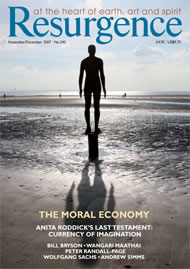THE RISE OF Europe to world dominance in the 19th century has aroused the curiosity of historians for a long time. Why was Europe able to leap ahead of the rest of the world? Kenneth Pomeranz of the University of California at Los Angeles has advanced an ‘environmental’ hypothesis. He wondered how England had suceeded in moving ahead of China, notwithstanding the fact that China had been on a level of development comparable to England as recently as around 1750.
According to his studies, at the end of the 18th century both China and England were constrained in their economic development by the scarcity of land available to grow food, supply fuel, and provide material. But it was only England that succeeded in overcoming this limitation. For England was able to tap into new stocks of resources: it began to massively import agricultural goods from North America, and, above all, set out to systematically utilise coal for industrial processes. As foreign land replaced domestic land, and carbon substituted for wood, the constraints were left behind and the English economy was able to take off.
Put more generally, access to fossil resources from the crust of the Earth and to biotic resources from (ex-)colonies was essential to the rise of the Euro-Atlantic civilisation. Industrial society would not exist in today’s shape had not resources been mobilised from both the depth of geological time and the expanse of geographical space.
In hindsight, Europe’s development path turns out to be a special case; it cannot be repeated everywhere and at any time, for the wealth of fossil and renewable raw materials at Europe’s disposal in the 19th and 20th centuries is no longer available. Fossil resources, apart from destabilising the Earth’s climate, are gradually running short, just as there are no colonies left to take biotic resources from.
At any rate, raw materials have to be purchased at considerable prices, or the inner parts of a country have to be turned into colonies – as can be observed in today’s Brazil or India. Resources, now and in the foreseeable future, are neither easily accessible nor cheaply available. It will, therefore, be a hopeless endeavour to bring prosperity and wellbeing to the majority of the world’s peoples by imitating the Euro-Atlantic example. It will barely be possible to have success in the 21st century on the basis of the utopias of the 19th century.
However, far from being just a bio-physical fact, ecological limits are often the cause of social explosions. To whom do oil reserves, rivers, forests and the atmosphere belong? How much is a nation – or a social class – entitled to take for its own wellbeing, without restricting the rights of others? The more the carrying capacity of ecosystems approaches its limits, the greater is the threat to weaker nations and groups to lose out in the competition with more powerful ones.
Resource conflicts are fuel for minor and major confrontations, which may set villages or whole countries ablaze. Petrol in the pumps becomes more expensive, regions become arid as water reserves dry up, the price of imported grain skyrockets, and fishermen return home with empty nets. Social peace often breaks down even before environmental peace is seriously disturbed. As the resource crunch intensifies, conflicts will flare up in many places and make the world as a whole more inflammable.
Against this backdrop, it is unwise to look at the industrial patterns of production and consumption as the standard for equity and wellbeing. It is difficult to see how, for instance, the automobile society, high-rise housing, chemical agriculture or a meat-based food system could be spread across the globe. The resources required for democratising these models of wealth globally would be too vast, too expensive, and too damaging for local ecosystems and the biosphere.
Since the Euro-Atlantic model of wealth has grown out of historically exceptional conditions, it cannot be transferred to the world at large; in other words, it is structurally incapable of justice. Development, therefore, is moving into a dilemma. Either wellbeing remains confined to a minority because the prevailing styles of production and consumption cannot be generalised, or sustainable models of wellbeing take hold, opening the opportunity for sufficient prosperity for all. Since both affluence and equity cannot be attained, one can either opt for affluence and oligarchy or for sufficiency and equity. Seen from this angle, the choice between destructive and sustainable models of wealth is not so much a choice which separates the exploiter of Nature from the lover of Nature as it is a choice which separates the elitist from the democrat. In any case, production and consumption patterns will not be capable of justice unless they are resource-light and compatible with living systems. In the 21st century, there will be no equity without ecology.







